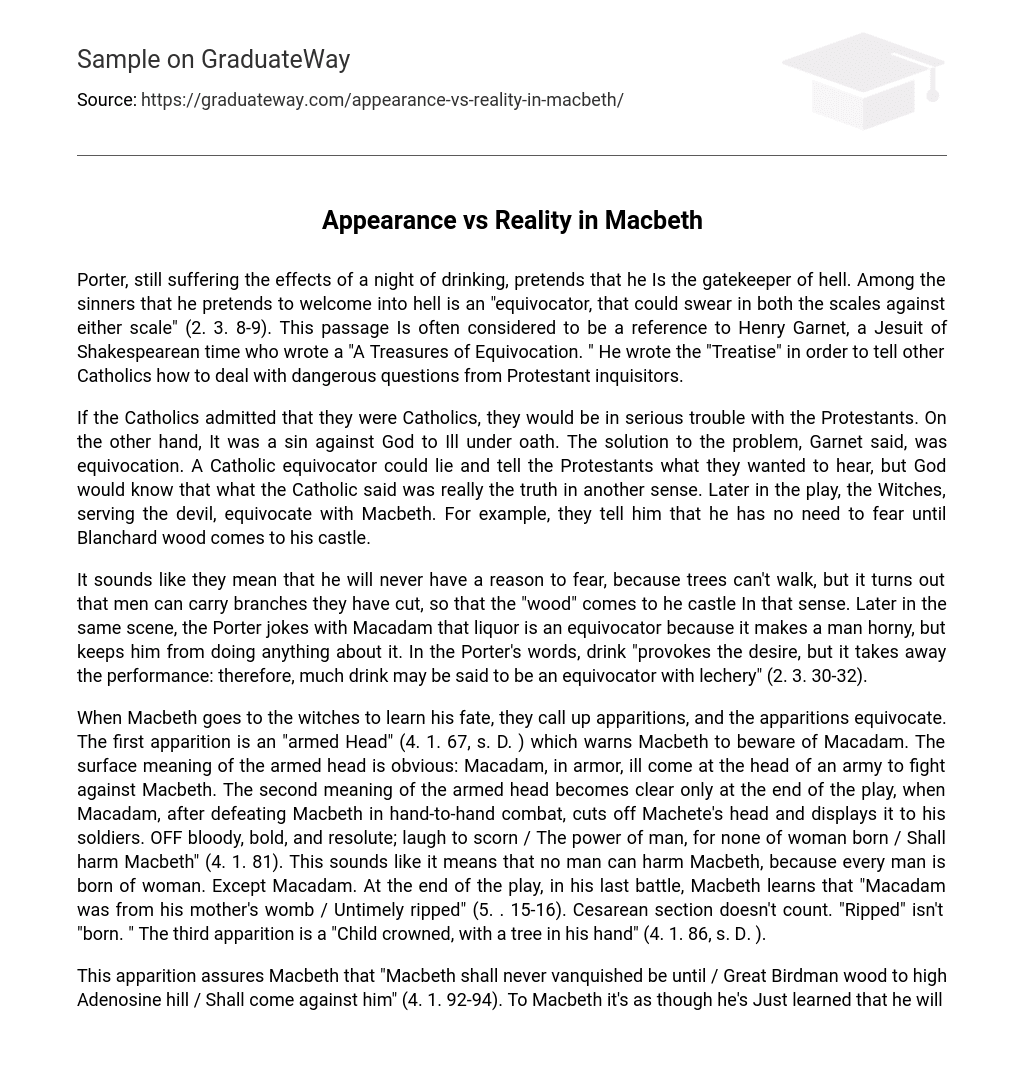Porter, still impacted by a night of heavy drinking, assumes the role of the gatekeeper of hell. In his portrayal, he welcomes sinners into hell, including an individual who possesses the ability to deceive and take either side when weighing arguments. This part of the text is often interpreted as a allusion to Henry Garnet, a Jesuit during Shakespeare’s era who authored “A Treasures of Equivocation”. In this work, Garnet aimed to educate fellow Catholics on handling challenging inquiries from Protestant inquisitors.
The Catholics would face severe consequences from the Protestants if they openly admitted their Catholicism. However, it was considered a sinful act against God to lie under oath. Garnet proposed equivocation as the solution to this dilemma. By equivocating, a Catholic could deceive the Protestants by telling them what they wanted to hear, yet God would acknowledge that the Catholic’s words held a different truth. In a later scene of the play, the Witches, who served the devil, employed equivocation when interacting with Macbeth. For instance, they assured him that he had nothing to fear until Blanchard wood reached his castle.
It seems like they mean that he will never have a reason to be afraid, because trees cannot move, but it turns out that men can carry branches they have cut, so that the “wood” comes to the castle in that sense. Later in the same scene, the Porter jokes with Macadam that alcohol is an equivocator because it arouses a man’s desires but prevents him from acting on them. In the Porter’s words, drink “provokes the desire, but it takes away the performance: therefore, much drink may be said to be an equivocator with lechery” (2. 3. 30-32).
When Macbeth seeks the witches to discover his destiny, they summon apparitions that speak ambiguously. The initial apparition is an “armed Head” (4. 1. 67, s. D.) that warns Macbeth to be cautious of Macadam. Initially, the literal meaning of the armed head is apparent: Macadam, dressed in armor, will lead an army to fight against Macbeth. However, the deeper significance of the armed head becomes clear only towards the end of the play. After defeating Macbeth in hand-to-hand combat, Macadam beheads him and presents it to his soldiers. “OFF bloody, bold, and resolute; laugh to scorn / The power of man, for none of woman born / Shall harm Macbeth” (4. 1. 81). This seems to imply that no man can harm Macbeth since every man is born of a woman, except for Macadam. Eventually, during his final battle, Macbeth discovers that “Macadam was from his mother’s womb / Untimely ripped” (5. .15-16). A cesarean section doesn’t meet the criteria of being “born.” In terms of the third apparition, it appears as a “Child crowned, with a tree in his hand” (4. 1. 86, s. D.).
The apparition tells Macbeth that he will never be defeated until the Great Birdman brings wood to a high Adenosine hill (4. 1. 92-94). Macbeth interprets this as a guarantee of his invincibility, but the meaning behind the apparition is different. Macbeth himself realizes that the crowned child represents a king’s son, commonly believed to be Malcolm, who is the son of Duncan. Ultimately, Macbeth dies and Malcolm is set to become the new king.
The child carries a tree in his hand to demonstrate how Birdman wood will be brought to Machete’s castle. Soldiers will use branches and saplings as camouflage during the transportation. In a scene summary, the Son of Macadam learns that his father might be considered a traitor. He asks his mother for the definition of a traitor and she responds, “Why, one that swears and lies” (4. 2. 47). “One that swears” refers to someone who takes an oath to tell the truth or pledges allegiance to his king. A person who “swears and lies” is someone who makes a false oath without intending to keep it.
The passage is often interpreted as a reference to Henry Garnet’s doctrine of equivocation. However, Macadam’s son jokes that almost everyone “swears and lies” at some point. [Scene Summary] Macadam is in England seeking Malcolm’s support for a war against Macbeth. Ross enters and reports on the terrible things Macbeth has done in Scotland. Macadam inquires about his wife and children, to which Ross responds that they are “well.” Macadam reiterates the question, asking if the tyrant has caused them harm. (4.3.178)
Ross responds evasively, stating that the people Macbeth killed were peaceful when he left them (4. 3. 179). It is clear that Macbeth did more than disturb their peace, he actually killed them and they are now at peace in heaven. Ross has good intentions and wants to spare Macbeth’s feelings, at least for now. [Scene Summary] A messenger informs Macbeth that the forces led by Malcolm are advancing towards Adenosine, and claims to have observed movement in Birnam woods. Macbeth becomes fearful and suspects that the devil is using deception to deceive him.





